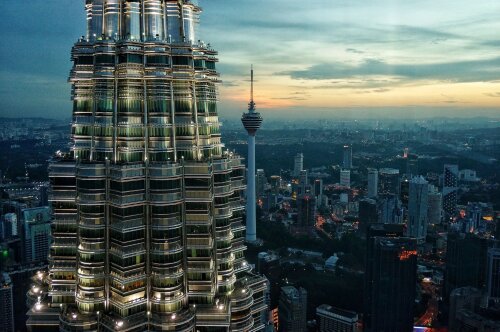Best Energy, Environment & ESG Lawyers in Kuala Lumpur
Share your needs with us, get contacted by law firms.
Free. Takes 2 min.
List of the best lawyers in Kuala Lumpur, Malaysia
About Energy, Environment & ESG Law in Kuala Lumpur, Malaysia
Energy, Environment, and ESG (Environmental, Social, and Governance) law is an evolving legal field in Kuala Lumpur, Malaysia. It covers the rules and regulations governing energy production and use, environmental protection, and the growing emphasis on sustainability and corporate social responsibility. With Kuala Lumpur being the commercial hub of Malaysia, the city is greatly influenced by national regulations as well as international standards. Companies and individuals operating in or around Kuala Lumpur must navigate complex legal requirements to ensure compliance in areas such as renewable energy development, pollution control, land use, resource management, climate change mitigation, and reporting on ESG metrics.
Why You May Need a Lawyer
There are several situations in which seeking legal advice in the field of Energy, Environment, and ESG may be necessary. Some common scenarios include:
- Starting or expanding a business that uses or produces significant amounts of energy, especially if it involves renewable or alternative sources.
- Developing new infrastructure or engaging in construction projects where environmental impact assessments and compliance with environmental regulations are required.
- Facing enforcement actions, penalties, or investigations related to environmental pollution, emissions, or non-compliance with energy regulations.
- Engaging in mergers, acquisitions, or investments where ESG risks and liabilities must be assessed as part of due diligence.
- Needing to prepare mandatory sustainability or ESG reports for regulators, investors, or the public.
- Seeking incentives for clean energy projects or navigating grid connection regulations in Kuala Lumpur.
Local Laws Overview
The legal framework for Energy, Environment, and ESG in Kuala Lumpur is shaped by both federal and state legislation, as well as guidelines from various government agencies. Key legal aspects include:
- The Environmental Quality Act 1974 sets standards for pollution control, licensing, and environmental impact assessment requirements for projects in Kuala Lumpur.
- The Renewable Energy Act 2011 and regulations by the Sustainable Energy Development Authority (SEDA) govern the production, licensing, and use of renewable energy.
- Energy governance and efficiency standards are administered by the Energy Commission under the Energy Commission Act 2001.
- The Malaysian Code on Corporate Governance and requirements of Bursa Malaysia guide ESG disclosures, ethical conduct, and sustainability reporting for listed and large companies.
- Local government authorities in Kuala Lumpur may implement stricter land use, zoning, and waste management by-laws.
- International treaties and accords ratified by Malaysia, including commitments under the Paris Agreement, influence local policy and can affect business obligations and opportunities.
Frequently Asked Questions
What is meant by ESG in Malaysia?
ESG stands for Environmental, Social, and Governance. In Malaysia, ESG refers to how companies manage environmental impact, social responsibility (such as labor practices and community relations), and governance (including business ethics and compliance). ESG is increasingly important for investors, regulators, and consumers.
Do I need an environmental impact assessment for my project in Kuala Lumpur?
Depending on the nature and scale of your project, an environmental impact assessment (EIA) may be mandatory under the Environmental Quality Act 1974. Projects that may significantly affect the environment are required to submit an EIA for approval before proceeding.
Which authority regulates energy matters in Kuala Lumpur?
The Energy Commission (Suruhanjaya Tenaga) is primarily responsible for regulating electricity and piped gas supply industries in Malaysia, including Kuala Lumpur. Renewable energy development is overseen by SEDA Malaysia.
What are the penalties for breaching environmental laws?
Penalties for breaching environmental laws in Malaysia can include fines, suspension of business activities, and in severe cases, imprisonment. Administrative actions and remedial orders can also be issued by environmental authorities.
Is sustainability reporting mandatory for companies in Malaysia?
For listed companies on Bursa Malaysia, sustainability reporting is mandatory. The requirements cover disclosures on material sustainability matters, including ESG risks and opportunities. Private and smaller companies may also opt for voluntary ESG reporting.
How can I get incentives for renewable energy projects?
The Malaysian government offers incentives for renewable energy projects through programs such as Feed-in Tariffs (FiT), Net Energy Metering (NEM), and various tax incentives. Information is available through SEDA Malaysia and the Malaysian Investment Development Authority (MIDA).
Are international ESG standards recognized in Malaysia?
While Malaysia has its own ESG guidelines, international standards such as the Global Reporting Initiative (GRI) and United Nations Sustainable Development Goals (UN SDGs) are widely referenced by Malaysian companies and regulators.
When should I consult a lawyer for energy or environmental matters?
You should consult a lawyer before starting projects that may affect the environment, when expanding into new energy ventures, if faced with enforcement actions, or when navigating ESG compliance and disclosures.
What happens if a company fails to comply with ESG requirements on Bursa Malaysia?
Non-compliance can lead to regulatory sanctions, reputational damage, or suspension of trading activities. Bursa Malaysia may also require companies to take corrective actions or improve disclosures.
Can individuals report environmental violations in Kuala Lumpur?
Yes, individuals can report violations to the Department of Environment (DOE) Malaysia. Reports can be made about illegal dumping, pollution, or other environmental offenses.
Additional Resources
Several public agencies and organizations provide support, information, and enforcement in areas related to Energy, Environment, and ESG:
- Department of Environment (DOE) Malaysia: Oversees environmental protection, pollution control, and enforcement.
- Energy Commission (Suruhanjaya Tenaga): Regulates energy supply, efficiency, and safety.
- Sustainable Energy Development Authority (SEDA) Malaysia: Implements renewable energy policies and incentives.
- Malaysian Investment Development Authority (MIDA): Provides investment incentives and information on green technology projects.
- Bursa Malaysia: Issues sustainability reporting guidelines and ESG standards for listed companies.
- Malaysian Green Technology and Climate Change Corporation (MGTC): Promotes green technology adoption and climate action initiatives.
Next Steps
If you require legal assistance in the area of Energy, Environment, and ESG in Kuala Lumpur, Malaysia, consider taking the following steps:
- Identify the specific issue or project for which advice is needed, such as regulatory compliance, project development, or dispute resolution.
- Gather all relevant documents, permits, correspondence, and evidence that may be helpful for your case or inquiry.
- Research or contact law firms with expertise in Energy, Environment, and ESG regulations, or approach legal aid centers with relevant experience.
- Prepare a list of questions and clarify your objectives before your consultation.
- Stay informed about ongoing changes to regulations, incentives, and ESG frameworks that may impact your rights or responsibilities.
Professional legal advice can help ensure your project operates within the law, minimize risks, and take advantage of opportunities presented by developments in Energy, Environment, and ESG in Kuala Lumpur, Malaysia.
Lawzana helps you find the best lawyers and law firms in Kuala Lumpur through a curated and pre-screened list of qualified legal professionals. Our platform offers rankings and detailed profiles of attorneys and law firms, allowing you to compare based on practice areas, including Energy, Environment & ESG, experience, and client feedback.
Each profile includes a description of the firm's areas of practice, client reviews, team members and partners, year of establishment, spoken languages, office locations, contact information, social media presence, and any published articles or resources. Most firms on our platform speak English and are experienced in both local and international legal matters.
Get a quote from top-rated law firms in Kuala Lumpur, Malaysia — quickly, securely, and without unnecessary hassle.
Disclaimer:
The information provided on this page is for general informational purposes only and does not constitute legal advice. While we strive to ensure the accuracy and relevance of the content, legal information may change over time, and interpretations of the law can vary. You should always consult with a qualified legal professional for advice specific to your situation.
We disclaim all liability for actions taken or not taken based on the content of this page. If you believe any information is incorrect or outdated, please contact us, and we will review and update it where appropriate.
Browse energy, environment & esg law firms by service in Kuala Lumpur, Malaysia
Kuala Lumpur, Malaysia Attorneys in related practice areas.

















